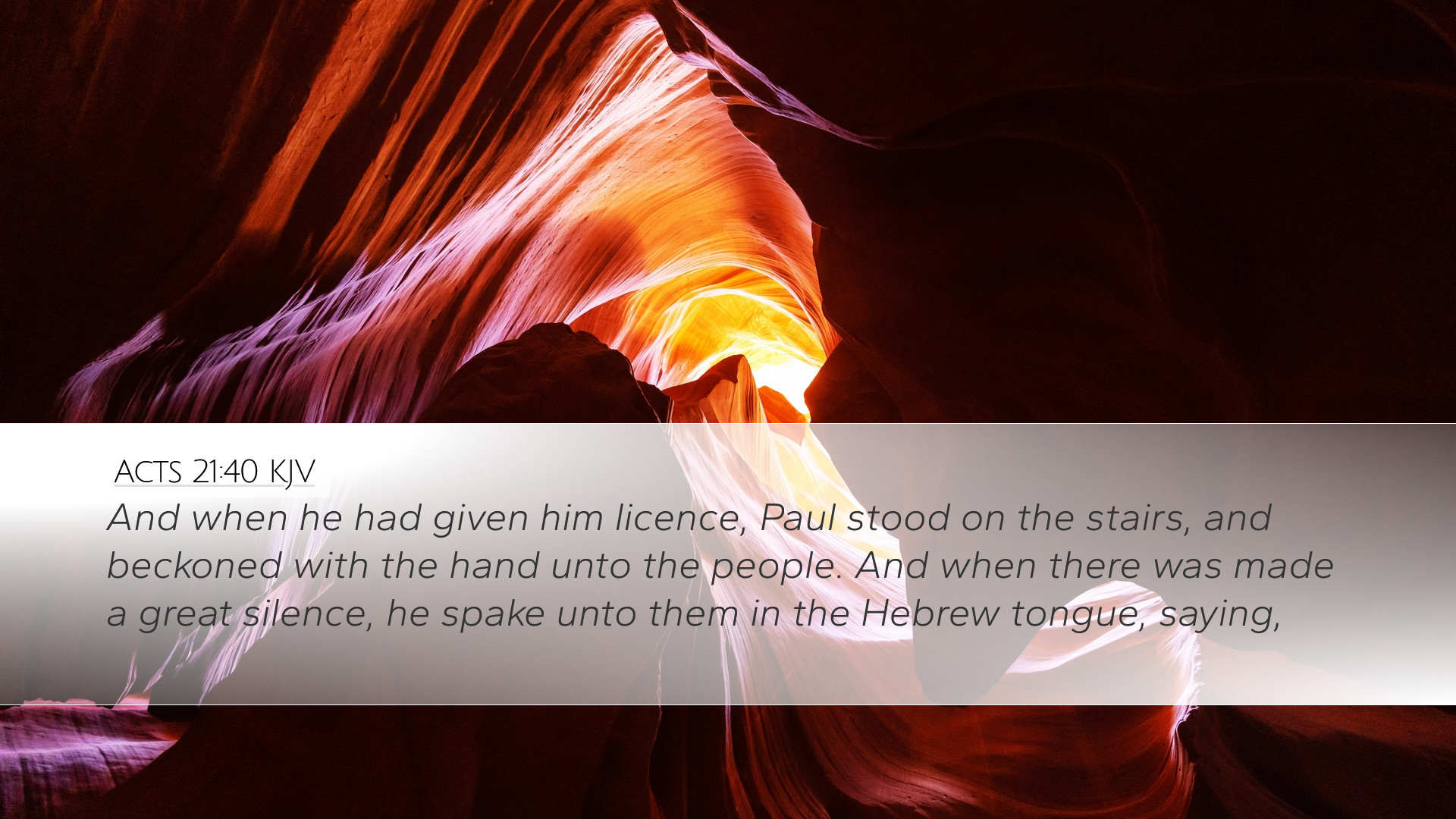Acts 21:40 Commentary
In Acts 21:40, we find a pivotal moment in the life of the Apostle Paul as he speaks to the people of Jerusalem after being seized by a violent mob. This verse captures Paul’s attempt to address the crowd, showing not only his fearless spirit but also his commitment to the Gospel. The following commentary synthesizes insights from various public domain sources, providing a comprehensive understanding of this significant moment.
Text of Acts 21:40
“And when he had given him permission, Paul stood on the stairs, and beckoned with the hand unto the people. And when there was made a great silence, he spake unto them in the Hebrew tongue, saying,”
Context of the Passage
Before delving into the commentary, it is crucial to consider the context surrounding Acts 21:40. Paul had returned to Jerusalem, aware of the potential dangers and the hostility he might face because of his ministry to the Gentiles. The previous chapters illustrate the escalating tension between Paul and certain Jewish groups who viewed his teaching as a threat to their traditions and beliefs.
Examination of Key Themes
- The Authority of Paul: Paul’s request to address the crowd demonstrates his conviction and authority. He does not shy away from the danger or the hostility, but rather confronts it head-on, suggesting a deep-seated confidence in his mission. Albert Barnes notes that even after being attacked, Paul does not resort to violence but instead seeks to reason with his opponents.
- Language and Communication: The choice of the Hebrew language is significant. Paul addresses his audience in their native tongue, a deliberate strategy to connect with them on a cultural level. This indicates his sensitivity to their background and tradition. Adam Clarke emphasizes that this choice of language was a tactical means to garner their attention and respect, underlining Paul’s understanding of effective communication.
- The Power of Silence: The reference to a “great silence” points to the momentous nature of what Paul was about to say. Both Matthew Henry and Albert Barnes highlight the miracle of silence in a tumultuous situation, suggesting that the crowd, despite their earlier hostility, was momentarily hushed, indicating a readiness to listen.
Theological Implications
Acts 21:40 emphasizes several theological themes that resonate throughout the New Testament:
- Commitment to the Gospel: Paul's readiness to speak even in the face of potential death reflects the Christian call to persevere in spreading the Gospel. His actions echo the Great Commission's mandate for believers to witness boldly.
- Divine Providence: The unfolding events illustrate God's sovereign hand in Paul’s life, allowing him an opportunity to preach in a hostile environment. The commentators agree that God’s purpose transcends human opposition, and Paul's situation is an embodiment of that truth.
- Identity and Heritage: By speaking in Hebrew, Paul also affirms his Jewish identity, seeking to bridge the gap between belief and ethnicity. This aspect of his identity is significant in grounding his authority to speak to the Jewish people. This is further elaborated by Clarke, who explains the necessity of understanding one's heritage while preaching the Gospel.
Application for Today
In reflecting on Acts 21:40, ministers and scholars can glean several lessons for contemporary application:
- Boldness in Sharing the Gospel: Like Paul, believers today are called to confront challenges in their ministry with courage and conviction. The world often presents opposition, yet it is essential to stand firm in one’s faith and mission.
- Effective Communication: Understanding one’s audience is crucial in ministry. The ability to speak a familiar language—whether literally or metaphorically—can facilitate deeper connections and understanding.
- Respect for Heritage: Acknowledging and respecting cultural and religious backgrounds can enhance dialogue and foster relationships. Encouraging intercultural conversations within the church can strengthen unity in diversity, reflecting the body of Christ.
Conclusion
Acts 21:40 serves as a remarkable example of Paul’s unwavering commitment to his mission amidst hostility. By standing firm and using his heritage to connect with his audience, he demonstrates important principles of effective ministry. The insights from public domain commentaries illuminate the passage, offering valuable lessons that remain applicable for pastors, students, theologians, and Bible scholars in their pursuit of understanding and preaching the Gospel.


